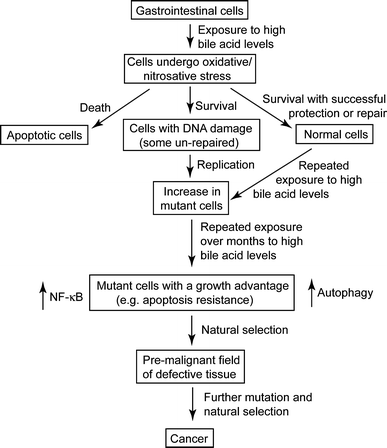Carcinogenicity of deoxycholate, a secondary bile acid - PubMed (original) (raw)
Carcinogenicity of deoxycholate, a secondary bile acid
Carol Bernstein et al. Arch Toxicol. 2011 Aug.
Abstract
High dietary fat causes increased bile acid secretion into the gastrointestinal tract and is associated with colon cancer. Since the bile acid deoxycholic acid (DOC) is suggested to be important in colon cancer etiology, this study investigated whether DOC, at a high physiologic level, could be a colon carcinogen. Addition of 0.2% DOC for 8-10 months to the diet of 18 wild-type mice induced colonic tumors in 17 mice, including 10 with cancers. Addition of the antioxidant chlorogenic acid at 0.007% to the DOC-supplemented diet significantly reduced tumor formation. These results indicate that a high fat diet in humans, associated with increased risk of colon cancer, may have its carcinogenic potential mediated through the action of bile acids, and that some dietary anti-oxidants may ameliorate this carcinogenicity.
Figures
Fig. 1
Role of bile acids in progression to cancer
Fig. 2
Normal areas of colons of mice from 4 different dietary groups. Diet supplements fed for 10 months: a none; b CGA; c DOC; d DOC + CGA. Images taken at 200× magnification. Bars show 0.2 mm. H&E staining
Fig. 3
Opened mouse proximal colon segments showing tumors after feeding the DOC-supplemented diet. Each opened colon segment is shown (top images), with the macroscopically observed tumors identified with closed dashed curves (bottom images). Left images: 8 months on diet; Right images: 10 months on diet
Fig. 4
Two areas of mouse colonic mucosa with sessile serrated adenomas (a, b) and two areas with adenocarcinomas (c with a stage T1, and d with a stage T2 cancer). From mice fed the DOC supplemented diet for 10 months. Images taken at 200× magnification. Bars show 0.2 mm. H&E staining
Comment in
- Bile acids as colon carcinogens and coffee ingredients as antagonists.
Bolt HM, Marchan R, Hengstler JG. Bolt HM, et al. Arch Toxicol. 2011 Aug;85(8):859-60. doi: 10.1007/s00204-011-0737-7. Arch Toxicol. 2011. PMID: 21786129 No abstract available.
Similar articles
- Bile acids as colon carcinogens and coffee ingredients as antagonists.
Bolt HM, Marchan R, Hengstler JG. Bolt HM, et al. Arch Toxicol. 2011 Aug;85(8):859-60. doi: 10.1007/s00204-011-0737-7. Arch Toxicol. 2011. PMID: 21786129 No abstract available. - Secondary bile acids effects in colon pathology. Experimental mice study.
Saracut C, Molnar C, Russu C, Todoran N, Vlase L, Turdean S, Voidazan S, Copotoiu C. Saracut C, et al. Acta Cir Bras. 2015 Sep;30(9):624-31. doi: 10.1590/S0102-865020150090000007. Acta Cir Bras. 2015. PMID: 26465107 - The effect of calcium on the pathogenicity of high fat diets to the colon.
Bruce WR, Bird RP, Rafter JJ. Bruce WR, et al. Princess Takamatsu Symp. 1985;16:291-4. Princess Takamatsu Symp. 1985. PMID: 3916201 Review. - Secondary Bile Acids and Short Chain Fatty Acids in the Colon: A Focus on Colonic Microbiome, Cell Proliferation, Inflammation, and Cancer.
Zeng H, Umar S, Rust B, Lazarova D, Bordonaro M. Zeng H, et al. Int J Mol Sci. 2019 Mar 11;20(5):1214. doi: 10.3390/ijms20051214. Int J Mol Sci. 2019. PMID: 30862015 Free PMC article. Review.
Cited by
- Diet, microbiota, and microbial metabolites in colon cancer risk in rural Africans and African Americans.
Ou J, Carbonero F, Zoetendal EG, DeLany JP, Wang M, Newton K, Gaskins HR, O'Keefe SJ. Ou J, et al. Am J Clin Nutr. 2013 Jul;98(1):111-20. doi: 10.3945/ajcn.112.056689. Epub 2013 May 29. Am J Clin Nutr. 2013. PMID: 23719549 Free PMC article. - Do Bacteria Provide an Alternative to Cancer Treatment and What Role Does Lactic Acid Bacteria Play?
Dicks LMT, Vermeulen W. Dicks LMT, et al. Microorganisms. 2022 Aug 27;10(9):1733. doi: 10.3390/microorganisms10091733. Microorganisms. 2022. PMID: 36144335 Free PMC article. Review. - Contribution of the 7β-hydroxysteroid dehydrogenase from Ruminococcus gnavus N53 to ursodeoxycholic acid formation in the human colon.
Lee JY, Arai H, Nakamura Y, Fukiya S, Wada M, Yokota A. Lee JY, et al. J Lipid Res. 2013 Nov;54(11):3062-9. doi: 10.1194/jlr.M039834. Epub 2013 Jun 1. J Lipid Res. 2013. PMID: 23729502 Free PMC article. - The Pros and Cons of Low Carbohydrate and Ketogenic Diets in the Prevention and Treatment of Cancer.
Elisia I, Krystal G. Elisia I, et al. Front Nutr. 2021 Feb 25;8:634845. doi: 10.3389/fnut.2021.634845. eCollection 2021. Front Nutr. 2021. PMID: 33718419 Free PMC article. - Fibre-rich Foods to Treat Obesity and Prevent Colon Cancer trial study protocol: a randomised clinical trial of fibre-rich legumes targeting the gut microbiome, metabolome and gut transit time of overweight and obese patients with a history of noncancerous adenomatous polyps.
Hartman TJ, Christie J, Wilson A, Ziegler TR, Methe B, Flanders WD, Rolls BJ, Loye Eberhart B, Li JV, Huneault H, Cousineau B, Perez MR, O'Keefe SJD. Hartman TJ, et al. BMJ Open. 2024 Feb 5;14(2):e081379. doi: 10.1136/bmjopen-2023-081379. BMJ Open. 2024. PMID: 38316601 Free PMC article.
References
- Alberts DS, Martínez ME, Hess LM, Einspahr JG, Green SB, Bhattacharyya AK, Guillen J, Krutzsch M, Batta AK, Salen G, Fales L, Koonce K, Parish D, Clouser M, Roe D, Lance P. Phoenix and Tucson gastroenterologist networks. Phase III trial of ursodeoxycholic acid to prevent colorectal adenoma recurrence. J Natl Cancer Inst. 2005;97:846–853. doi: 10.1093/jnci/dji144. - DOI - PubMed
- Bernstein C, Bernstein H, Garewal H, Dinning P, Jabi R, Sampliner RE, McCuskey MK, Panda M, Roe DJ, L’Heureux L, Payne C. A bile acid-induced apoptosis assay for colon cancer risk and associated quality control studies. Cancer Res. 1999;59:2353–2357. - PubMed
- Bernstein H, Holubec H, Warneke JA, Garewal H, Earnest DL, Payne CM, Roe DJ, Cui H, Jacobson EL, Bernstein C. Patchy field defects of apoptosis resistance and dedifferentiation in flat mucosa of colon resections from colon cancer patients. Ann Surg Oncol. 2002;9:505–517. doi: 10.1007/BF02557276. - DOI - PubMed
Publication types
MeSH terms
Substances
LinkOut - more resources
Full Text Sources
Medical



